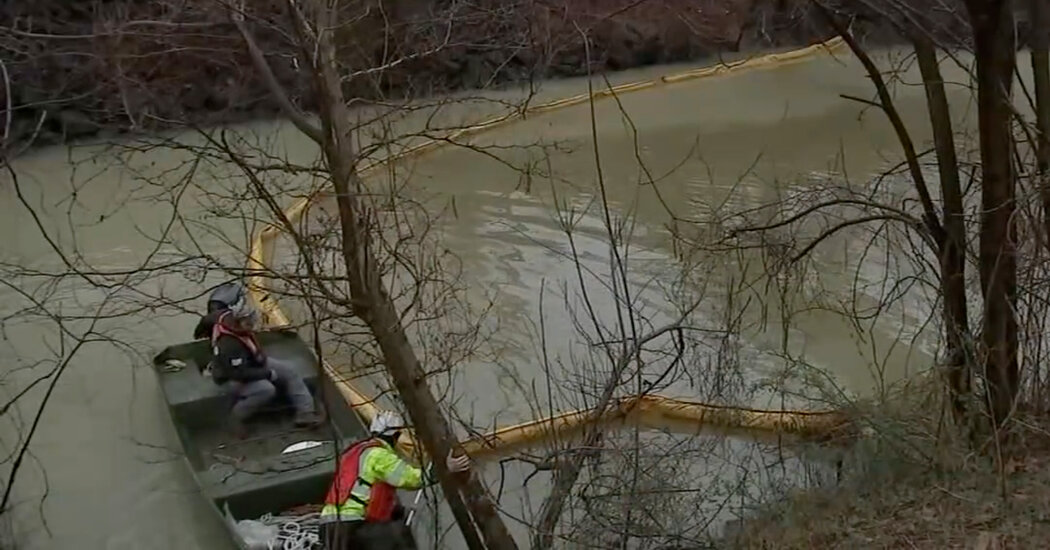Philadelphia officials on Sunday suggested residents consider using bottled water rather than tap water for drinking and cooking after a chemical spill into a tributary of the Delaware River, a source of drinking water for about 14 million people across four states.
A pipe ruptured at Trinseo PLC, a chemical plant, late on Friday, sending about 8,100 gallons of a water-soluble acrylic polymer solution into Otter Creek in Bucks County, north of Philadelphia, officials said.
“Contaminants have not been found in our water system at this time,” Michael Carroll, Philadelphia’s deputy managing director for transportation, infrastructure and sustainability, said at a news conference on Sunday morning.
However, he said, “we cannot be 100 percent sure that there will not be traces of these chemicals in the tap water,” adding that a low level of exposure would not endanger human health.
The assurances from city officials did little to quell a rush to buy bottled water, videos on social media showed. Local television news also showed residents emptying grocery shelves of bottled water on Sunday afternoon.
The spill appeared to result from an equipment failure, Trinseo said in a statement. Company representatives could not immediately be reached for further comment on Sunday.
“It’s like the material you find in paint,” Tim Thomas, a vice president at the Trinseo chemical plant, told WPVI-TV in Philadelphia. “It’s your typical acrylic paint you have in your house. That’s what really this material is, in a water base.”
Philadelphia’s water system serves about 2 million people in the city and surrounding counties, sourcing more than half of it from the Delaware River basin. The Delaware River also supplies water to Delaware, New Jersey and New York.
The Pennsylvania Department of Environmental Protection said that on-site water samples had not detected any contaminants. As of Sunday morning, “no additional product was leaving the facility and entering the Delaware River,” the agency said.
Still, the U.S. Coast Guard, which also responded to the spill, said that people should avoid the site where cleanup operations were underway.
Mr. Carroll said at the news conference that there were no concerns over skin exposure to the chemical or of a fire hazard.
“Bathing and washing dishes do not present a concern,” he said. “Likewise, we have no concern over inhaling fumes at the levels we are evaluating.”
In an update Sunday evening, Mr. Carroll said that tidal conditions and rain on Saturday should help the river “flush itself out” into the Delaware Bay.
“In a matter of days, the water in the Delaware should be OK,” Mr. Carroll added, emphasizing that the water in the tap — coming from water treatment facilities that were sampled for contamination earlier in the day — would be safe to drink until at least Monday evening.
After the spill, the city took in enough river water to supply its customers through Monday. Officials were confident that the supply was not contaminated. They planned to take in more water Sunday evening to reach customers’ taps by Tuesday — if testing proves that the fresh supply is safe.
“The earlier advisory that customers receiving water from the Baxter Drinking Water Treatment Plant may choose to drink bottled water on March 26 was issued out of an abundance of caution,” the city said in a statement.
Two of the chemicals released through the burst pipe were butyl acrylate and ethyl acrylate, both colorless liquids with an acrid odor that are used for making paints, caulks and adhesives.
Both chemicals can cause breathing difficulties and irritation of the eyes and skin, according to the National Institute for Occupational Safety and Health.
Butyl acrylate was among the hazardous materials aboard the Norfolk Southern train that derailed and ignited a toxic chemical fire in East Palestine, Ohio, in February.
With the scope of the Norfolk Southern disaster still unknown, some people expressed a wariness to trust officials’ assurances that the Friday spill in Bucks County was not dangerous.
Comments posted on Facebook about the news conference by Philadelphia officials drew parallels to the Ohio derailment and reflected a reluctance to drink the municipal tap water.


